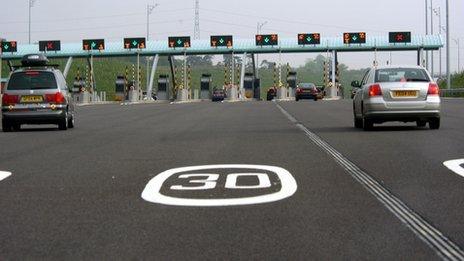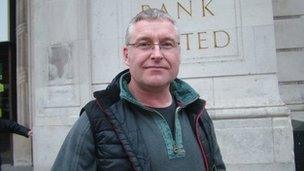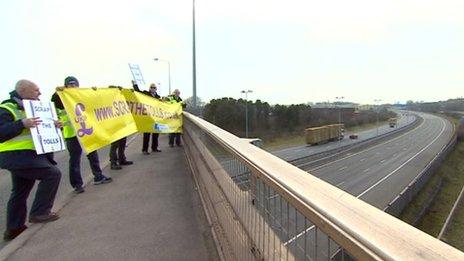M6 Toll: Is it a complete failure?
- Published

The firm that runs the toll motorway said it was "nonsense" to suggest the road has not been of benefit
It was plugged as a way of relieving pressure on the M6 and making motorists' lives easier. But 10 years on, the M6 Toll is handling half the number of vehicles it was intended for. Is it a complete failure?
The M6 Toll - a 27-mile route between Cannock and Coleshill - has been controversial since it opened in 2003.
It has produced "no net benefit for drivers whilst causing huge and irreversible environmental damage," according to the Campaign for Better Transport.
Hailed as a relief road that would carry 75,000 vehicles per day and free up space on the clogged-up M6, it averaged just 36,000 vehicles per day last year.
The motorway, which charges cars £5.50 and lorries £11, has also failed to relieve stress on the M6, where 1,700 more vehicles use that section of motorway each day than 10 years ago.
'Too expensive'
"This road has helped no one, not local people, not drivers and certainly not the company who own it," said campaigner Sian Berry.
John McGoldrick, from the National Alliance Against Tolls, went even further - describing it as "disaster for almost everyone".
"It has absolutely not been a success," he said.
He said its owner, Midland Expressway Limited, faced a dilemma. The road is losing money but the only way it can make more money is to increase fees, most likely resulting in even fewer drivers using it.
Chris Crean, from West Midlands Friends of the Earth, said the toll road had actually shifted traffic to other areas.
"We have seen no evidence that traffic on the M6 has been relieved," he said.
Mr Crean said the only true way to ease traffic was to provide drivers with viable public transport alternatives.
The M6 Toll, originally called the Birmingham Northern Relief Road, starts at junction 3a of the M6 in Warwickshire and rejoins it at 11a in Staffordshire.
'Never use it'
Ed Neely, of Birmingham hauliers Neely Transport Ltd, said the firm never used the road because it did not want to pay the fee.
"I think it has helped us a bit by easing traffic on the M6," he said.
"If it was free we'd use it a lot more."
John Highway, from West Bromwich-based Devaneys Haulage Ltd, said the firm had used it just twice - once because a driver took a wrong turn.
"We never use it because there is never any need for us to use it," he said.
Darren Ager from Tamworth, a haulage driver for Sainsbury's, said he did not use the road.
"I think we would use it more if it were free," he said. "It would be useful because one of the junctions is right outside our depot."
Patti Bailey from Coventry said she had not used the road "for about five years", preferring to take the train if she had to travel.

Antony Parker, who uses the road once a month, said he would like to see a more flexible pricing strategy
Antony Parker from Coventry, who works in banking, uses the road about once a month for work.
"It's a useful road," he said. "If I have to be somewhere in a hurry and I can charge it to the company, then it's fantastic compared to the M6.
"But I would rarely use it at weekends. It's purely about cost. If you can take your time then it's not worth it."
Figures from Midland Expressway Limited showed it was used an average of 36,000 times a day in 2011 and 2012 and 43,000 times a day so far in 2013.

In March, Cheslyn Hay residents held a protest claiming their village was being used as a cut-through to avoid the toll
Chief executive Tom Fanning said despite the lower vehicle numbers it had been a success.
"It's a nonsense to suggest that the M6 Toll benefits no‐one," he said.
"The Campaign for Better Transport report has conveniently ignored the fact that up to 50,000 customers choose to use the M6 Toll each work day - this is traffic that would otherwise be adding to the existing congestion on the M6 motorway."
He said the route had been affected by the "prolonged economic downturn" but said customer satisfaction surveys showed the road was a reliable alternative to the M6.
'Clearer picture'
He added: "Since opening the M6 Toll over 150 million transactions have taken place, with customers choosing to use our service to bypass Birmingham because they value their time and they know that our charges represent value for money."
Dr Pat Hanlon, a senior lecturer in transport economics at the University of Birmingham, said it was too soon to brand the road a failure.
"I think it's difficult to say it's been a success when the traffic volumes being achieved are well below those originally projected," he said.
"But you should not see it as a disaster altogether.
"I look at the M6 Toll as being a long-term thing. Ten years may seem a long time but roads last in our country for centuries. I suspect some of the roads the Romans made weren't very well-used when they were first built.
"With the economic climate as it is, a lot of people aren't using their cars. When the recession really ends then we will get a clearer picture of how much it is needed."
M6
- Published22 April 2013
- Published18 March 2013
- Published18 May 2012
- Published22 December 2012